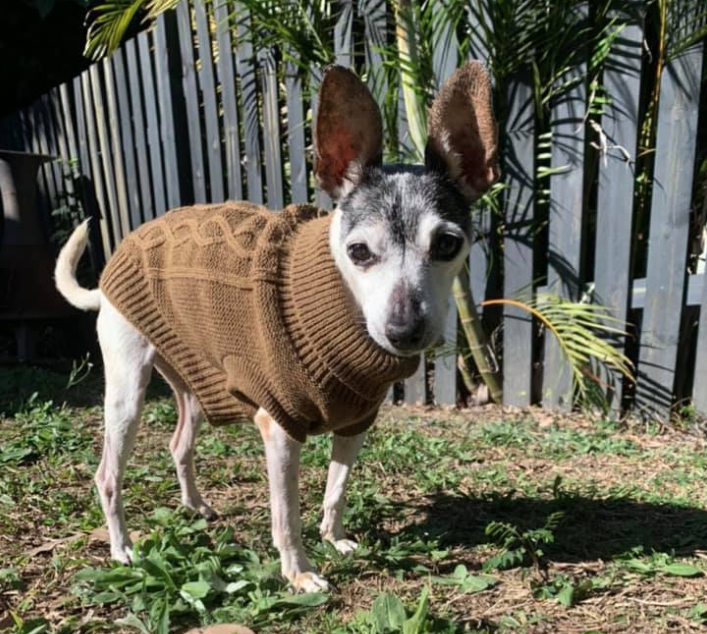 You've adopted a dog - here's what to expect post-adoption
Read more
You've adopted a dog - here's what to expect post-adoption
Read more
Last updated: 20 Oct, 2023
Published on: 19 Jul, 2023
Love is… caring for a senior pet

We are a nation of pet lovers, and it’s common for us to lament the comparatively shorter lives of our furry family members. We want to give our pets the happiest and longest lives possible. We also have greater access to life-extending veterinary treatments than ever before. This has meant many of our pets experience a longer period of ‘old age’, and also that we spend more time caring for them.

What the potato wants, the potato gets! Mash always loved care rides, so on challenging days where it was harder for her to get up and about, her humans would take her for a little road trip to cheer everyone up.
What changes as your pet ages?
There is no specific age that defines a pet as a senior. A nine-year-old cat may be considered a senior pet but go on to live for another nine happy years. An eleven-year-old Jack Russell could be considered ‘younger’ than an eight-year-old Great Dane. If your furry friend is a rat that’s older than four, you should probably start checking if they have magical powers!
Typically, our concept of pet ‘old age’ relates more to the changes we've noticed in them rather than their actual age. Senior pets often live without showing any signs of aging until they approach their final years. This is why it can feel like the ageing of our pets often sneaks up on us. The playful cat you welcomed into your life now prefers snoozing in the sunshine rather than adventuring. The boisterous dog that would jump up to greet you when you came through the door is now slower getting up from its bed.
Like us, elderly pets can face a range of age-related health issues, including;
-
reduced mobility
-
impaired vision or hearing
-
increased susceptibility to medical illnesses
-
cognitive changes
Paying attention to your pet's routines for eating, drinking, toileting, exercising and sleeping can help you spot changes early. You can then choose to speak to your vet about ways to support your best friend through their golden years.
Many people are surprised to discover that behavioural changes in older pets are often caused by age-related pain. When a pet isn’t feeling their best, it’s only natural that they have less patience around other pets or people within their household. But a check-up and some medication can help a senior pet to feel comfortable again.
Modern-day veterinary hospitals can offer access to human-standard diagnostic technology. Plus, there are a wide variety of medications and treatments available to help us manage our pet's health. This enables an exceptional standard of care for our pets and means we are better equipped to maintain their quality of life for as long as possible.
It’s also reassuring to know that, unlike us, our pets aren’t concerned about the future or how much time they may have left. Our pets live in the moment, and with you by their side, their twilight years can be the best of their lives!

Holly sporting her dapper beige cardigan and enjoying the sunshine.
What does all this mean for you as your furry friends guardian?
If you’ve never loved a pet through its senior years before, it may be difficult to know what to expect. Every pet’s journey is a little different. However, as your pet nears ‘their time’, they will likely have their good days and their bad days.
In a practical sense, caring for a geriatric pet mostly requires patience and understanding. There can be toileting accidents, finicky eating habits and medications to administer. Even navigating sensory and mobility obstacles, like climbing stairs or jumping up onto couches, can be part of the process.
From the perspective of someone who loves a pet, it can be a bit of an emotional rollercoaster. Despite this, caring for a senior pet doesn't have to be stressful or complicated. So much of providing care for an older pet is about taking each day as it comes and rolling with the punches. Having realistic expectations of your own physical and emotional capacity for providing care will also help to keep things on track.
Some days your fussy eater will devour the food you’ve prepared for them. Some days they might refuse even their favourite treats, and that’s okay. As PetRescue’s resident vet nurse, Vicki shares:
“Speaking from personal experience, I have cared for two elderly dogs, Holly and Rhino, who had kidney issues. Reduced appetite is a common challenge in pets with renal failure. For me, the mealtimes when I couldn't tempt them to eat anything were really emotional. But at some point, I had to accept that I could only do so much. They were on medications, and I could offer their favourite foods and try to entice them with games, but if they didn't feel up to eating, that really was beyond my control. I learned to keep my chin up and just try again later.”
Similarly, it can be upsetting if your furry pal struggles to play as they once did. But our pets do adapt and find joy in new, more achievable activities.
“My current elderly terrier, Snoopy, cannot manage to go for walks these days. I feel sad about this, but I can also see the enjoyment she gets from plodding around the garden each day. I watch her enjoying the sun's warmth and having a leisurely sniff of anything she finds interesting. Wonderfully, she seems to find millions of interesting things to sniff, even in my small garden. For her, this activity is thoroughly enriching, and it brings me so much joy to watch her. “

Snoop might not be able to manage a walk in the same way she used to, but she sure loves a leisurely sniff around the garden.
So, while it’s true that there will be challenges to face, there are also many new pleasures for us and our pets to find. Ultimately, your unconditional love is the best gift you can give your pet as they age. Noticing your pet's little age-related quirks and making some changes to see that they are still happy and content is exceptionally rewarding. There is nothing we can do to enable our pets to live forever, but giving them a happy and comfortable period of old age is a truly wonderful thing!
No matter the difficulties you might face caring for a senior pet, you’re not alone. There are many places you can turn to for support or advice, including vets, online or in-person community groups and even family and friends. If you find yourself wondering when the ‘right time’ might be to say goodbye to your pet, you can find some helpful resources here.
And here's the good news. For most pets, spending quality time with their human is their favourite thing, and age certainly doesn’t limit the number of cuddles we can give them! So here’s to you and your senior pet and all of the memories you are still creating together!

Find out more about caring for a senior dog or a senior cat from our friends at Pet Circle.
When it comes to adopting a senior pet, what you see is what you get! They've had years to fully form their personalities, so you can find a sweet senior who is well-suited to your family, lifestyle and home
Read more about all the wonderful reasons to adopt a senior pet here.













































